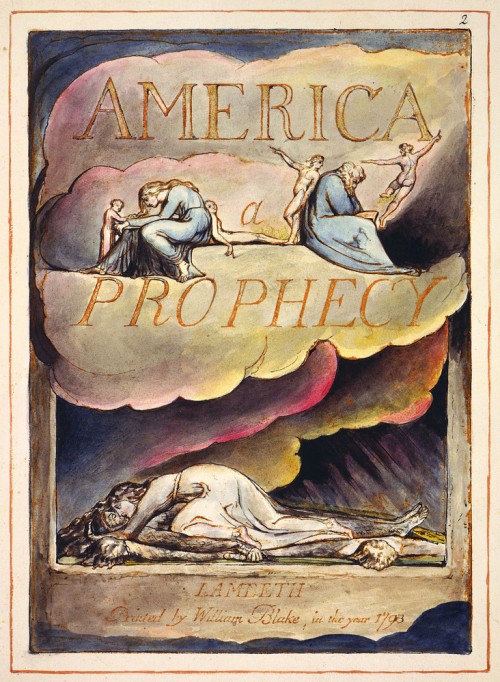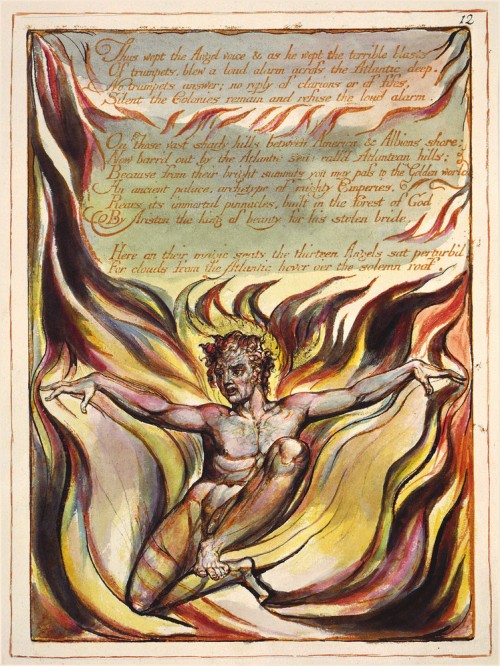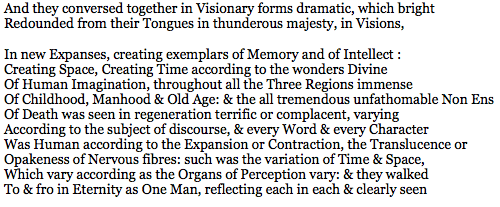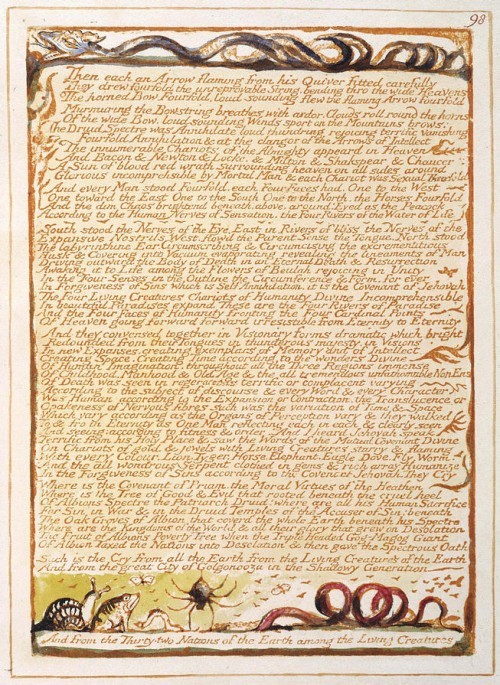
For the eye altering alters all
William Blake, “The Mental Traveler”
Who reads Blake? The easy answer is almost everyone who reads poetry—that is, has read some Blake—and can quote something. “A rose is a rose is a rose…”—oops, wrong everyone-has-read, but the point is almost everyone can quote something by either Blake or Gertrude Stein. “To see a World in a Grain of Sand” can be found on the poetryloverspage.com. (Auguries of Innocence) But depending on what one means by read, both Blake and Stein are equally unread.
And that’s not the only reason for mentioning these poets together. Most to the point is that to read them in the way they intend is to be changed, that is, to misapply Yeats, “changed utterly: A terrible beauty is born”—“terrible,” that is, from the perspective of… let’s call it the literarily conservative part of the mind. The further you read in their work, the greater the change… in reading. They’re at the top of my list of poets who invent their readers anew, showing in fact that great poets may invent generations of readers, with no going back—at least for some. I’m not fond of rating poets, but “great” here belongs to usage like “the great San Francisco earthquake,” only the rumble coming from Blake as a social phenomenon took many decades—a slow buildup still in progress.
In fact, the song-like appearance of simplicity of some poems gives cover to the subversive complexity of the work overall. The ease of misreading—or rather reading with stepped-down intensity—is true for some of both poets’ work. The unforgettable performance of Songs of Innocence and Experience by Allen Ginsberg, for instance, does make it go down easy, yet it’s clear that he got Blake at a serious level of personal vision, reporting that he had heard, while reading, “a very deep earthen grave voice in the room, which I immediately assumed, I didn't think twice, was Blake's voice.” Ginsberg seems to have received a transmission of the voice quality he experienced, an unpretentious yet joyous earthen gravity in his recital both of Blake and his own work. One can’t help wondering if Howl could have come to be without that experience of reading—a reading that hears something beyond itself.
There’s no single or right way to read Blake or Stein. And who can forget her voice, driving a poetic vehicle that is not built to stop! Despite generations of scholarship and criticism, we get confirmation only of the wide range of possibilities in approaching such poets. However, my interest in talking about reading them is not about interpretation, at least not in a narrow sense, but on the impact reading can have as a transformation within reading itself. What we do reading them that doesn’t happen elsewhere.
We tend to foreground “innovation” in poetry as the main event, often at the level of technique, diction and structure, but that hardly seems a sufficient focus. After all, we read ourselves in process—our own intentions, our meanings—as our texts, and in the writing we are reading as it emerges, “we” are almost instantly other than us. I’m guided here by my own early experience in the wake of reading and teaching Blake in a course I gave in my mid-twenties at Stony Brook University: Suddenly I was startled, excited yet perplexed, by what I was writing and by what turned out to portend major changes in my life and later work. I have imagined that Blake reading John Milton’s Paradise Lost was one of the most intensely transformative events of any age—but it’s an event that occurred and is still occurring in Blake’s Illuminated “epic” Milton a Poem—an event of transformation within reading that now is always already happening and yet is still to come.
There are so many ways that reading is transformed in that poem and other Illuminated (etched and colored in Blake’s technically innovative practice) poems like The Marriage of Heaven and Hell, America a Prophecy and Jerusalem: The Emanation of the Giant Albion, as well as his great manuscript poem Vala, or The Four Zoas. Reading them, for instance, in the now easily available and affordable facsimiles (all online free) is richly provocative as act of reading, unlike any other kind of reading: You feel the sheer physicality of the book, of Blake’s text-art, and of language itself—and moreover their serving together as vehicle of visionary travel/travail. Few actually read Blake the way he intended: it takes the energy of wrestling with an angel. A slowing of reading that seems intrinsic to poetry as an art registered in the physical voice and retaining vocalization even when “silent.” One of the benefits is the insight it gives into why book artists carry on the legacy of 3-D reading, with another “D” as tactility. Blake’s art is pervasively hands-on. It has book body as an event inside the body reading.
This physical dimension is more importantly a reflection of the dimensionality of reading itself in Blake’s sensorium. Amazingly there’s a portrait of his idea of active visionary reading and its contrary on the title page of America a Prophecy (see image above). You could say Blake visually thematizes his theory of reading. It shows, on the left of the “a” of the title, a woman reading to children: She leans into the book, as if to flow through it, while her legs, one forward, one back, seem to stride; the child in front reaches physically into the book as if taking hold of the words while turning pages; another, behind, rests against her as if absorbing the transmission bodily, and points down to the energetic italic word Prophecy (vs. the static word America above) and to the dead-warrior/lamenting-woman war scene at the bottom of the page. To the right, on the contrary, a bent and tired old man seems to be falling asleep leaning on the book, while a young man behind him points back toward the woman reading, and, to the further right, a female is leaping away into the air as if both escaping the man lost in reading and further embodying the levitating energy of (the woman’s) prophetic reading. I see this woman aloft as a page-turning torsional leap into the body of history in the prophetic book. Blake shows the invention of the Prophetic reader as a history-generating phenomenon that tracks actual historical disaster while teaching the reading mind to see beyond human ignorance and failed action. The allegory of the poem’s action is an allegory of history-changing reading.
Many-dimensional reading means many levels of impact. Fires rage through this poem of the American Revolutionary War in which the burning page is the matrix of revolutionary birth as Orc, agent of insurgency and poetic torsion, who rises like a Phoenix in Plate 10, threatening oppressive Urizen (King George):

Blake asks us to read by the principle of the textual action, inscribed at once in text, image and poetic process. This action includes syntax, phonology, visual words, spatial array, scale, story, whatever meets the eye! Fire is destructive up close (as the King, “Albion’s Angel,” sees it) and people flee, but it’s the motivational force of change as well and the revolutionary force of Orc.
We understand the poem according to the scale on which we read the events at hand. I’m always horrified when I hear of a forest fire destroying trees, animals, habitats, and homes, because I identify with the sufferers; but I’ve learned to consider as well that, on the scale of the forest itself or earth history in an ecological perspective, fire is also a regenerative force of long-range forest health. Blake asks us to read the tragic events of the present with the additional “prophetic” scale of seeing beyond to possible conscious evolution of human beings. This requires singular acts of transformation inside the alchemical work. The “event” is not just a matter of changing political philosophy or poetic form, but an actual process of mind and being non-separate from reading, with its torsional uncertainties and challenges to “selfhood”—the hardened mind that chooses war over eros.
In the degree of conscious change in how a poem works, Blake may have no equal before Modernist time, and in fact he seems in all essentials to belong to our time. Not all have appreciated this, even some who perhaps owe him an intrinsic debt. Certainly the James Joyce of Finnegans Wake did, his sleeping/waking giant a parallel to Jerusalem’s Albion, richly explored by Frances (Boldereff) Phipps in Let Me Be Los: A Codebook for Finnegans Wake (Station Hill Press, 1987). Marshall McLuhan’s The Gutenberg Galaxy (Toronto, 1962) paralleled passages of the Wake and Jerusalem as prophetic of the changes in culture resulting from the inventions of new media—from oral-tribal to handwriting-manuscript to printing press to “electrifying.” Blake said what changes is the relationship of the senses—“Which vary according as the Organs of Perception vary”—and for us that would be in how we, in the broadest sense, “read” the world, which determines consciousness.
The course I taught in Blake in my twenties followed one I gave on Ezra Pound’s Cantos the year before, and I was troubled by Pound’s disregard for Blake’s revolutionary work. No doubt he associated it with the literary excesses he saw in the 19th century Romantic inheritance. Yet both Blake and Pound saw usury (usura)—institutional greed and money power—as the greatest public detriment. The one opportunity I had to speak with Pound in person, thanks to New Directions publisher Jay Laughlin’s invitation to a small dinner (apparently the only time the poet returned to America after his St. Elizabeth confinement), I raised this question. We were in a rather noisy little Spanish restaurant on Bank St., and Pound, who rarely said anything at this stage of his life, spoke very softly at best. He ignored most questions, including this one: “Why not recognize Blake as an early ally at least on usura?” Repeating the question didn’t help. After a while I rephrased: “How much did you actually read Blake?” And just when I thought he was going to ignore this one too, he said, rather deliberately: “Not enough!”
Many poets of course have celebrated their Blake connection in ways that acknowledged the radical nature of his contribution, Robert Duncan perhaps foremost among these. Jack Spicer seems to have considered himself in a lineage with both Blake and Yeats as the recipient of poetic messages from the “outside,” which Spicer provocatively referred to as “spooks” and “Martians,” although of course, he assured us, not literally “little green men.” For these and a number of other poets who took Blake seriously at the level of his textual complexity, we find instances of a poetics of difficulty—a willingness to render the text as initiatory to alternative dimensions of reading. In Jerusalem Blake lays out the high stakes of appropriate readership:
I Give you the end of a golden string;
Only wind it into a ball,
It will lead you in at Heaven’s gate,
Built in Jerusalem’s wall…
At the level of Blake’s poetics, this is not a vision of transcendence but integration of vision and human life, discovered in the condition of a transformative art, but only if we can learn that art within reading. This process is not easy to characterize, and not just a literary discipline. Entering the Jerusalem of reading is to “converse” in “Visionary forms dramatic,” which remains “Human” and implies an ongoing oscillation “To & fro” between the altered state of reading and life lived intimately. Here is that crossing point on Plate 98 (of 100):


Poet, writer, musician, and artist George Quasha was born in White Plains, New York, and grew up in ...
Read Full Biography

